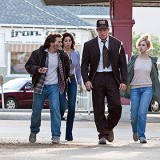It isn’t just the violence in William Friedkin’s Killer Joe that’ll make your stomach turn. It’s the sex, too. That combination – which results in several twisted scenes of sexual deviance – is so creepy, it suggests the NC-17 rating was well-deserved despite the studio’s appeal. In some NC-17 movies – Bad Lieutenant comes to mind – the images of exploitation are part of an artistic vision that provides a commentary on the relationship between sex and power. That can’t be said for Killer Joe. It’s not that the film doesn’t have a strong, clear message. It’s more the case that the movie just isn’t deep enough to justify its gruesomeness.
Friedkin (The French Connection, The Exorcist) attempts to create a modern noir film from the start. In the opening scene, Chris (Emile Hirsch) pounds on the door of his father’s trailer in the pouring rain. His stepmother Sharla (Gina Gershon), naked from the waist down, opens the door and the two get into an argument before Chris’s father Ansil (Thomas Haden Church) wakes up and settles them down. But then he, too, begins fighting with his son after hearing Chris needs several thousand dollars to pay off his supplier. All the while, Chris’s 20-year-old sister Dottie (Juno Temple) listens from her bedroom, clearly dismayed by the dysfunctional relationships.
Chris has a plan to keep the bad guys at bay. He tells his father that they can hire Joe Cooper (Matthew McConaughey), a dirty cop, to kill Chris’s birth mother so that Dottie will inherit a life insurance policy that they can then use to pay off the criminals. With little convincing Ansil is on board, but Joe demands $25,000 in advance and neither Chris nor Ansil has that kind of dough. But Joe suggests he could keep Dottie as his “retainer” until they have the money to pay him. It’s not giving too much of the plot away to say that everything goes terribly awry and Chris and Ansil find themselves in deep trouble. Meanwhile, Joe has been having his way with Dottie and seems to have really fallen for her. The final confrontation between Joe and the family (possession of Dottie is at the heart of the matter) is one ugly scene that results in serious bloodshed.
The film’s incomplete ending – we don’t know if Joe lives or dies – suggests screenwriter Tracy Letts, who based the movie on one of his own plays, might be ambivalent about whether or not this white trash family gets what it deserves. The film features some fine performances – Temple is particularly good as the family’s damaged daughter who’s smarter than you think. And it successfully evokes a dark mood. It’s just not deep enough to resonate on the level of something like No Good Country for Old Men, another deep dark tale that has more meaning at its core.









